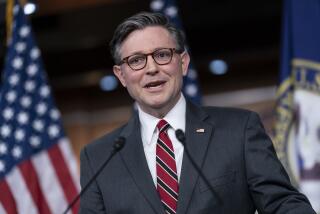Nunn Backs Allies’ Bosnia Stance : Diplomacy: Georgia Democrat says Britain and France better understand the Balkans. But he rejects criticism of U.S. for failing to send in troops.
- Share via
WASHINGTON — Clearly lining up on the side of Britain and France against President Clinton, Sen. Sam Nunn said Saturday that the United States should heed the advice of its allies, who reject Clinton’s proposal to try to end the year-old conflict in Bosnia-Herzegovina by lifting an arms embargo and launching air strikes against Serbian military positions.
“Our allies know more about it than we do,” said Nunn, the Georgia Democrat who is chairman of the powerful Senate Armed Services Committee. “I think we ought to listen to them.”
Nunn stressed that America’s European allies understand the history of the region more completely than America does and are more closely attuned to the day-to-day situation in the war-torn former Yugoslav republic.
“This is one of those areas where not acting, even though it may be subject to great criticism, . . . may be wiser than taking some kind of watered-down action that will not have any effect and may get us very much involved,” he said.
Clinton has tried without success to persuade Britain, France and other NATO countries to join the United States in putting an end to the arms embargo against Bosnia and launching air strikes against Serbian military positions there.
While he said he continues to hope the allies will sign on to the plan, he has recently mused publicly about the possibility of air strikes without lifting the embargo, while stressing that any action there should be multilateral.
Britain and France object to lifting the U.N.-imposed arms embargo, because they fear such a move would intensify the fighting. Clinton, on the other hand, contends that exempting Bosnia’s Muslims from the embargo would permit the severely outgunned Muslims to better defend themselves, ultimately pushing the two sides toward a cease-fire.
Nunn’s comments, on CNN’s “Evans and Novak” show, stand in sharp contrast to those of such members of Congress as Sen. Joseph R. Biden Jr. (D-Del.) who have denounced the allies’ criticism and encouraged the President to launch unilateral air strikes.
While calling for air strikes, Clinton has resisted European suggestions that he deploy American ground troops to help guard so-called “safe areas” for Muslim civilians in Bosnia.
Nunn lashed out at the Europeans for criticizing U.S. unwillingness to send in ground forces.
“I resent the criticism. . . ,” Nunn said. “We spent $4 trillion over 45 years protecting our allies. For them to criticize us for not being in the one area where they are acting, to some extent, on the ground without us--when we have something like 25% of the overall troops in the whole area--counting the naval deployment, I think is unjustified.”
While fervently opposing the deployment of U.S. troops in Kosovo, a province in Serbia populated largely by ethnic Albanians, Nunn said he would support use of ground forces in newly independent Macedonia if they were necessary. But he added that he had been assured by the president of that former republic of Yugoslavia that no troops are needed yet.
Furthermore, he said, if a peace accord is reached in the Bosnian conflict, America should not be expected to provide more than a quarter of the international peacekeeping contingent. He added that he would support the deployment of American troops for such a mission only if they were very well armed so they could “fight their way out of any kind of trouble.”
He said European troops on the ground now are “so lightly armed that they really don’t have a chance to defend themselves, let alone keep any kind of peace when conflict breaks out.”
When forming its Balkans policy, Nunn said, the United States should keep three major goals in mind: preventing the spread of the conflict, assuring the Muslim world that America is “concerned about what is happening to Muslims there,” and ensuring that U.S. action does not hamper Russia’s struggle toward democracy and a market economy.
Pressuring Russian President Boris N. Yeltsin to endorse the use of force against Serbia, Nunn said, “would cause Yeltsin an awful lot of problems.” Serbia is a traditional ally of Russia.
More to Read
Get the L.A. Times Politics newsletter
Deeply reported insights into legislation, politics and policy from Sacramento, Washington and beyond. In your inbox twice per week.
You may occasionally receive promotional content from the Los Angeles Times.










